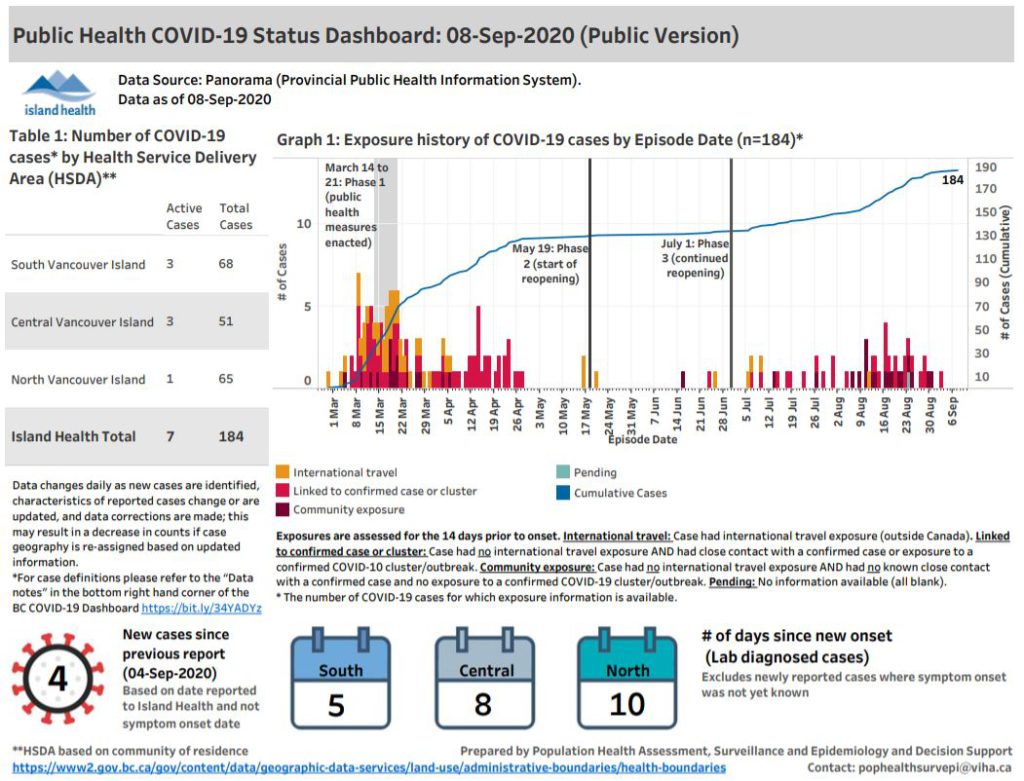
Nightclubs and banquet halls were ordered closed in B.C. on Tuesday as health officials announced there were 429 new cases of COVID-19 over the long weekend, including four new cases in Island Health.
Island Health has now had 184 COVID-19 cases since the start of the pandemic. There are now seven active cases in Island Health and no hospitalizations.
Of the four new cases announced Tuesday, two are on southern Vancouver Island, one is in central Vancouver Island and one is in northern Vancouver Island.

COVID-19 numbers in Island Health as of Sep. 4. (Island Health)
New restrictions
Dr. Bonnie Henry, the provincial health officer, said Tuesday that effective immediately, all nightclubs and stand-alone banquet halls have been ordered closed by the province.
Henry said she’s ordering the closures after recent spikes in cases linked to exposures at nightclubs and banquet halls.
She said the province’s philosophical approach to the pandemic has been to issue minimal mandatory restrictions — but that exposure events in venues like nightclubs had become a “major source” of transmission, putting strain on public health resources.
“We want to do the least amount we can by order, and make sure we can support people to do the right things they need to do for their own individual situation,” she said.
Bars, pubs and restaurants can still remain open but alcohol can no longer be served after 10 p.m. Those establishments must be closed at 11 p.m. unless providing a full meal service, in which case they may stay open, but can not serve liquor until 11 a.m. the following day.
The province is also requiring music or other background sounds, such as from televisions in bars, lounges, pubs and restaurants, must be no louder than the volume of normal conversation.
Henry said establishments that are a night club know they are a night club and not a bar, as do health officers.
“As our cases are climbing and as we are moving into respiratory season in the fall, we have to make changes. These restrictions are meant to take away that late-night temptation that people have where we know that mixing is going on,” Henry said.
“We recognize that these venues have tried. We’ve made adjustments but there are still exposures happening. Staff and customers have been put at risk. That’s why we are putting these additional restrictions today.”
Henry also said that B.C. residents should be easing up on social interactions as the fall approaches, reining in bubbles to five or six people.
Latest on B.C. COVID-19 cases
Twelve of the new cases in B.C. are epidemiologically-linked, meaning people who were never tested but were presumed to have COVID-19 because they developed symptoms and were close contacts of a laboratory-confirmed case.
From Friday to Saturday, there were 123 cases. From Saturday to Sunday, there were 116 new cases. From Sunday to Monday, there were 107 cases and from Monday to Tuesday there were 83 cases.
There were also two new COVID-19 deaths over the long weekend: one in Fraser Health and one in Vancouver Coastal Health. The B.C. COVID-19 death toll is now 213.
Overall, the province has had a total of 6,591 since the start of the pandemic, including 2,249 in Vancouver Coastal Health, 3,428 in Fraser Health, 184 in Island Health, 460 in Interior Health, 186 in Northern Health and 84 among residents outside of Canada (visitors and temporary foreign workers).
There are 1,386 active cases in B.C. and 4,978 people have recovered. Thirty-two people with COVID-19 are in hospital (up one from Sept. 4) with 12 in intensive care (no change from Sept. 4). A total of 3,363 people are under active public health monitoring as a result of identified exposure to known cases.
There are three new healthcare outbreaks: Burnaby General, Redo Retirement Centre and Holy Family Hospital. There are no new community outbreaks.
B.C. has posted detailed information about the geographic distribution of COVID-19 cases from January to July 2020. This map will be continually updated, according to B.C. health officials.

Geographic distribution of COVID-19 cases in B.C. from January to July 2020. (Province of BC)
Island Health’s COVID-19 data breaks down North, Central and South Island case counts and lists the number of days since any new lab-diagnosed cases. You can find the data here along with any public exposures.
To see B.C.’s COVID-19 numbers by day and health authority, along with testing numbers and recoveries, visit the B.C. COVID-19 dashboard. The numbers are updated at 4:30 p.m. PT each weekday.
To see a list of all provincial public COVID-19 exposures in the province, including links to exposures listed on health authority websites, visit the B.C. Centre for Disease Control website here.
Here are latest numbers of confirmed COVID-19 cases in Canada as of 4:37 p.m. PDT on Sept. 8, 2020:
- Quebec: 63,876 confirmed (including 5,770 deaths, 56,162 resolved)
- Ontario: 43,536 confirmed (including 2,813 deaths, 39,196 resolved)
- Alberta: 15,093 confirmed (including 247 deaths, 13,154 resolved)
- British Columbia: 6,591 confirmed (including 213 deaths, 4,978 resolved)
- Saskatchewan: 1,669 confirmed (including 24 deaths, 1,587 resolved)
- Manitoba: 1,349 confirmed (including 16 deaths, 940 resolved)
- Nova Scotia: 1,086 confirmed (including 65 deaths, 1,018 resolved)
- Newfoundland and Labrador: 269 confirmed (including 3 deaths, 265 resolved)
- New Brunswick: 192 confirmed (including 2 deaths, 186 resolved)
- Prince Edward Island: 53 confirmed (including 44 resolved)
- Yukon: 15 confirmed (including 15 resolved)
- Repatriated Canadians: 13 confirmed (including 13 resolved)
- Northwest Territories: 5 confirmed (including 5 resolved)
- Nunavut: No confirmed cases
Total number of COVID-19 cases in Canada: 133,747 (0 presumptive, 133,747 confirmed including 9,153 deaths, 117,563 resolved)
According to data collected by Johns Hopkins University and Medicine, the number of confirmed COVID-19 cases worldwide is now over 27.4 million. More than 894,000 COVID-19 deaths have been recorded.
Watch Dr. Bonnie Henry and Adrian Dix on Sept. 8 below
With files from CBC and The Canadian Press




